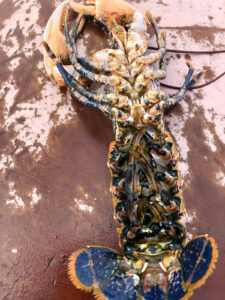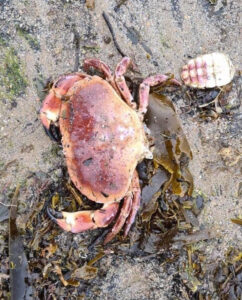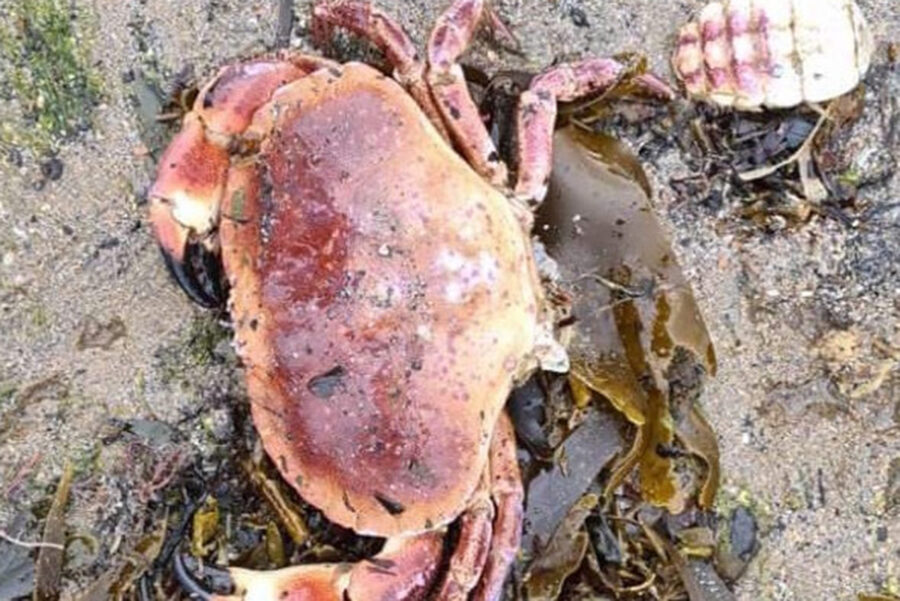North East fishermen call for urgent judicial review
Fishermen in North East England have started legal proceedings over the mass die-offs of shellfish and other marine life in the Tees and North Yorkshire coast region, reports Tim Oliver.
Lawyers Leigh Day, acting for Hartlepool fisherman Stan Rennie, on behalf of the North East Fishing Collective (NEFC), have written to the MMO informing them of possible judicial review proceedings in relation to the MMO’s licensing of dredging activities in the Teesside area.

One of the many photographs amassed in evidence by the NEFC, showing damage to the eggs on a berried lobster.
They ask the MMO to respond to their letter, dated 16 December, 2022, within five days or prior to the commencement of forthcoming capital dredging in the river Tees.
The lawyers tell the MMO they should suspend or revoke all dredging licences at least until the Defra-commissioned independent review that is currently underway concludes and publishes its final report.
They say it would be ‘unlawful’ for the MMO not to stop dredging because dredging activities under current licensing conditions are ‘likely to create an imminent risk of harm to the environment’.
“An urgent response within this period is clearly necessary and justified in circumstances where further dredging activity risks causing further irreparable harm,” the lawyers tell the MMO.
Since September 2021, a series of crustacean mass mortalities have occurred, and continue to occur, in the Teesside area, they say, and ‘the preponderance of evidence suggests that the mass mortalities may [lawyers’ italics] have been caused by pyridine released from sediment disturbed by dredging activities’.
They say they are writing to the MMO ‘as the agency responsible for the issuance and enforcement of licences for dredging under the Marine and Coastal Access Act 2009’.
This gives the MMO powers to ‘vary, suspend or revoke’ dredging licences, or to stop the issuing of any new licences, pending the conclusion of the independent review – which Defra has said will be completed during January.
The interim conclusions, published in May 2022, of the multi-agency investigation into the mortalities was that a likely cause was a naturally occurring algal bloom.
The lawyers note that the interim report considered a possible causal link between dredging and the die-offs because mortalities of crabs and lobsters occurred in the Teesside area ‘immediately after the commencement of dredging activity under licences granted by the MMO, including dredging by the Orca vessel in September and October 2021’.
“Subsequent episodes of mass mortalities following publication of the interim report have, likewise, occurred immediately after a period of dredging has commenced, further indicating that the interim report’s conclusions on likely causation may be wrong,” says the lawyers’ letter.

A dead crab washed up on a beach near Teesside.
A further ‘comprehensive report’ by university researchers published in early October 2022 found that ‘the crustacean mortalities were consistent with poisoning by industrial toxins, and raised concerns that the interim report had not considered results from any thorough or systematic tests for pyridine in sediment including arising from dredging’.
The Environmental, Food and Rural Affairs (EFRA) Committee then heard evidence on the mass mortalities, and wrote to the Defra secretary of state calling for further investigation, including analysis of the presence of the chemical pyridine in the Tees estuary, which researchers have identified as a possible cause.
Sir Robert Goodwill, chair of the EFRA Committee, told the Defra secretary that ‘dredging should be kept to the minimum level needed to keep the port operational until the panel’s investigation is complete’.
He also said it was ‘imperative’ that the MMO should urgently review dredging activity in the Tees, explore what steps could be taken to reduce the risk associated with dredging, and ‘ensure that all the current conditions on its licence are met and should include pyridine in the testing as part of any future licence approval process [and] all dredged material should be tested for pyridine and any that is found to have dangerous levels of pyridine should not be disposed of at sea’.
The lawyers conclude: “In light of the inconclusive findings of the interim report, the findings of the joint university report, and the secretary of state’s commission of the independent review, it is incontrovertible that at present there exists a likelihood that licensed activities may create a risk of harm.”
An MMO spokesperson said: “The Marine Management Organisation received a pre- action protocol letter from Leigh Day Solicitors, dated 16 December, 2022. We are considering the contents and will respond in due course.”
The MMO noted that dredging was ruled out as a likely cause of the incident in the Defra-led investigation. It said dredged sediment ‘must meet the highest international standards protecting marine life before it is permitted to be disposed of at sea’.
It added: “Whilst a Defra-led investigation concluded a naturally occurring algal bloom was the most likely cause of the crab and lobster deaths last year, the evidence is now being assessed by an independent expert panel. MMO is providing the independent panel with relevant data as requested.”
Algal bloom theory ‘a fantasy’
Hartlepool fisherman and vessel owner Stan Rennie, who is bringing the legal action on behalf of the NEFC, said the algal bloom that government agencies are blaming for the shellfish deaths was a ‘fantasy’ because the die-offs had been occurring now for ‘14 solid months’.
“They are not willing to halt the dredging to carry out full, truly independent investigations, made up from the agencies’ independent scientists, and with the independent scientific parties commissioned by the NEFC to ensure an unbiased outcome,” he told Fishing News.
“An outcome that would hopefully lead to the protection of the marine ecosystem from further devastation that will be caused by the removal of a further 1.7m tonnes of toxic dredged material from the freeport being dumped six miles offshore.”
He said that since Phase One of the freeport dredge started, there had been increased multiple mass die-offs and wash- ups of dead shellfish. The latest was of shrimps at Bridlington, just before Christmas – the third mass wash-up of shrimps on die-off zone beaches in the previous month.
“The agencies will yet again blame algae bloom or bad weather, but outside of the die-off zone, there are no reports of any wash-ups,” said Stan Rennie.
He pointed out that the die-offs had started at the exact same time as the Orca’s dredging work, and that the situation was getting ‘much worse’ since the supposedly contained freeport dredging began. An excavator had fallen into the Tees, and a coffer dam built from toxic sediment had been constructed to retrieve it, causing ‘huge toxic sediment release to the sea’.
“The North East public will have no confidence until a true independent body investigates,” he said. “We want justice.”
He said pyridine had been proven to be present in the sediment, but the Tees Valley Combined Authority had refused to allow the free sampling offered by the universities carrying out research. Pyridine and other substances had the potential to create destruction of the ecosystem over ‘a vast area’ of the North Sea, in addition to the 200 to 250 square miles already affected.
“A judicial review is needed to get to the truth, and the capital dredging must be halted until the review outcome is made public,” said Stan Rennie.
He said the die-offs had caused hardship and the loss of industry jobs, including half of the Hartlepool fleet.
“This can’t be allowed to continue in the Tees, or in any other area of the UK. Lessons need to be learned, so others don’t suffer the same damage to their local ecosystem as we have suffered.”
This story was taken from the latest issue of Fishing News. For more up-to-date and in-depth reports on the UK and Irish commercial fishing sector, subscribe to Fishing News here or buy the latest single issue for just £3.30 here.








